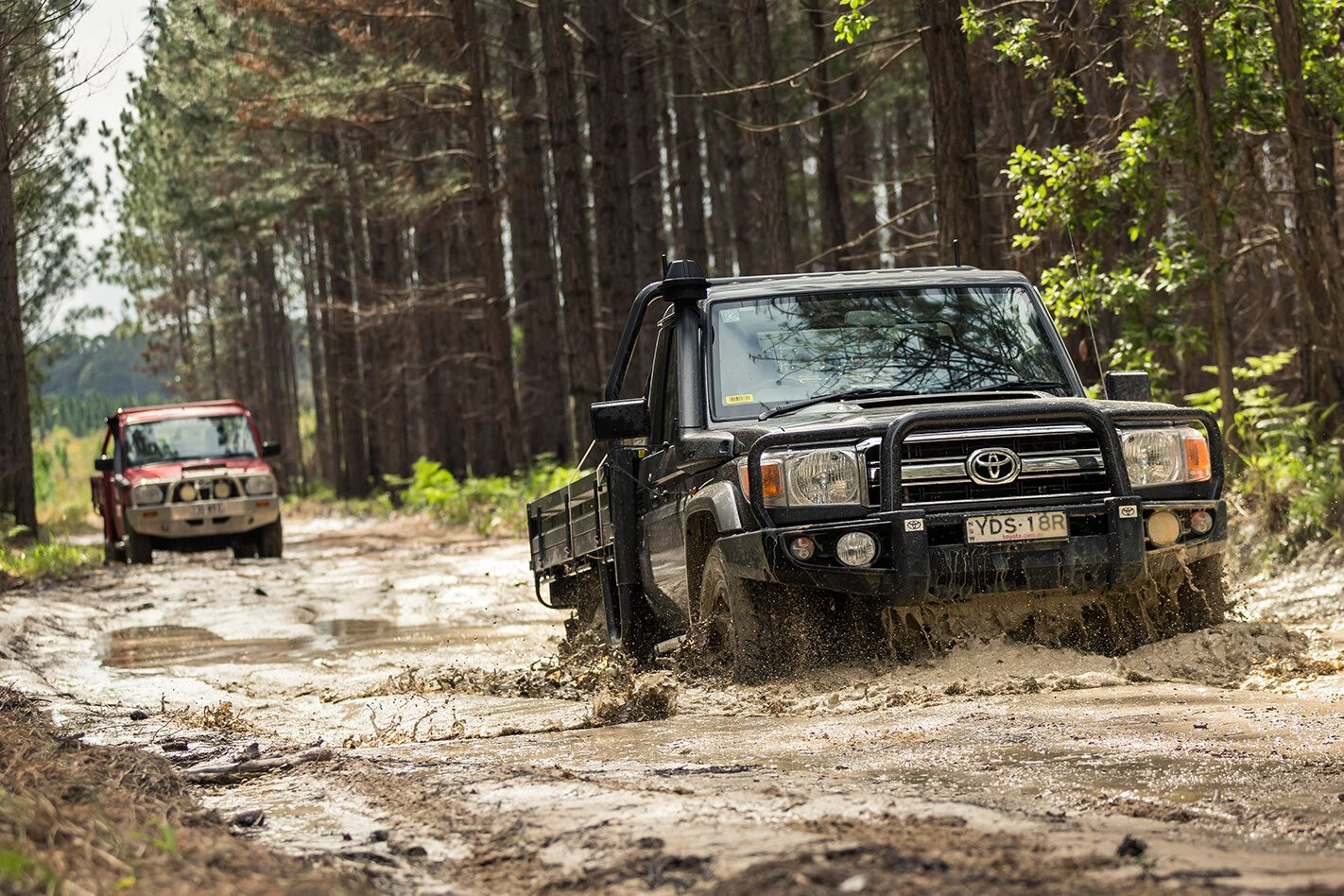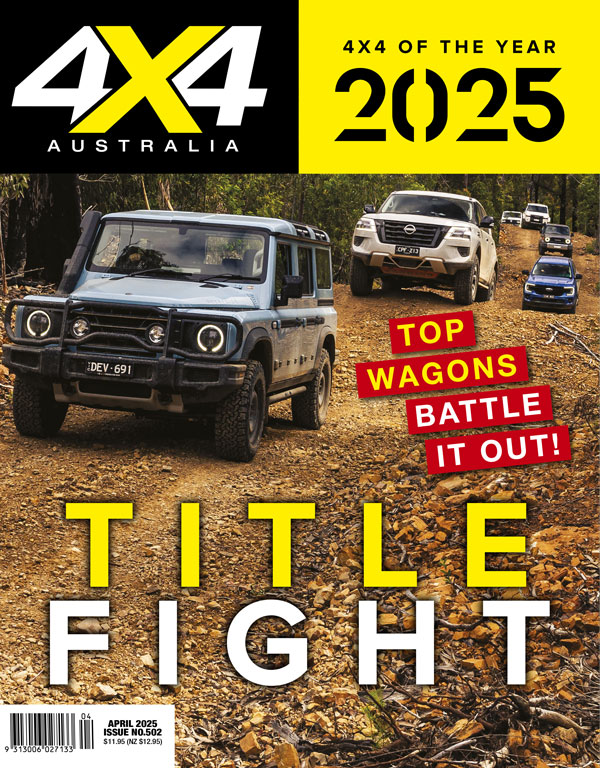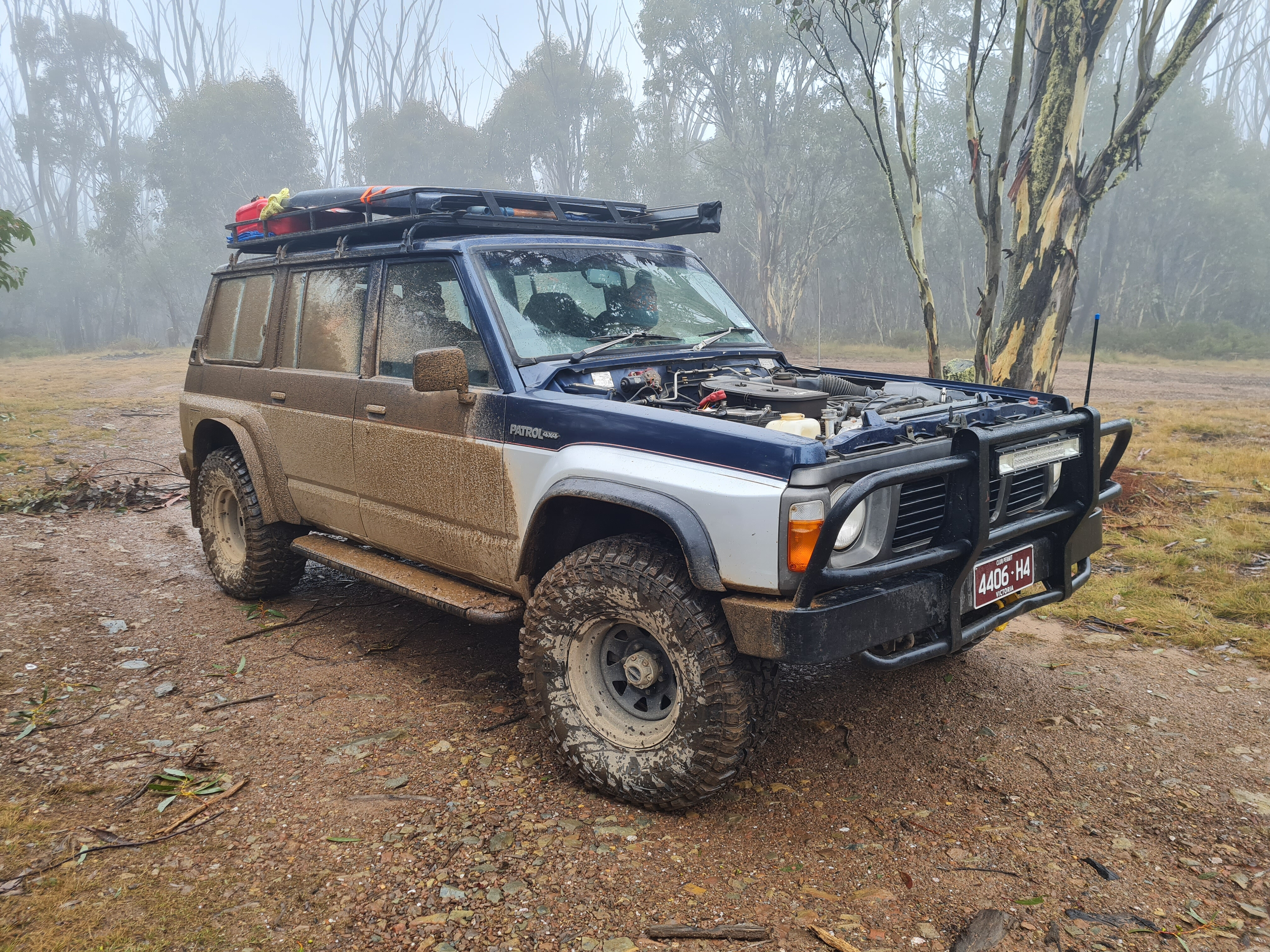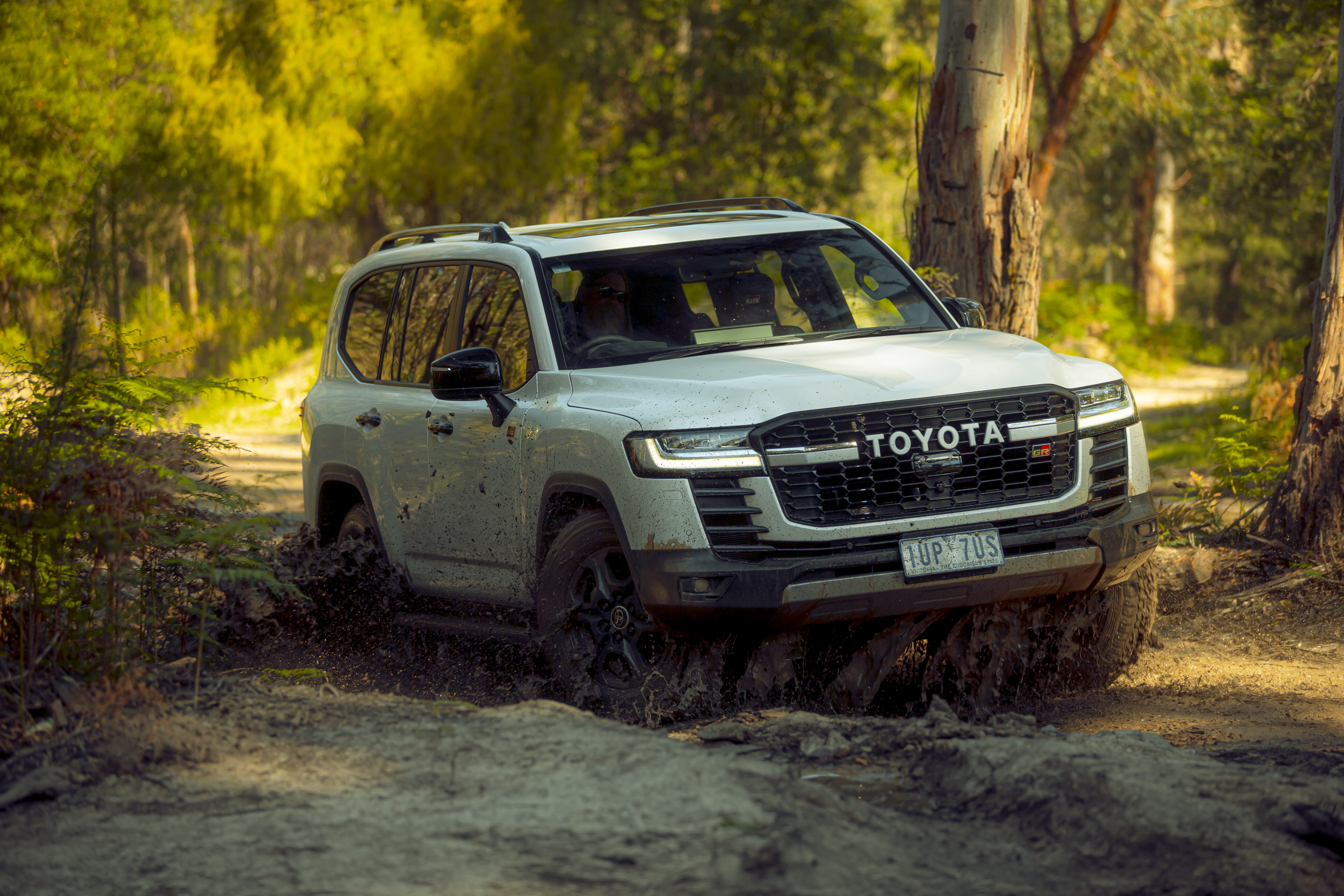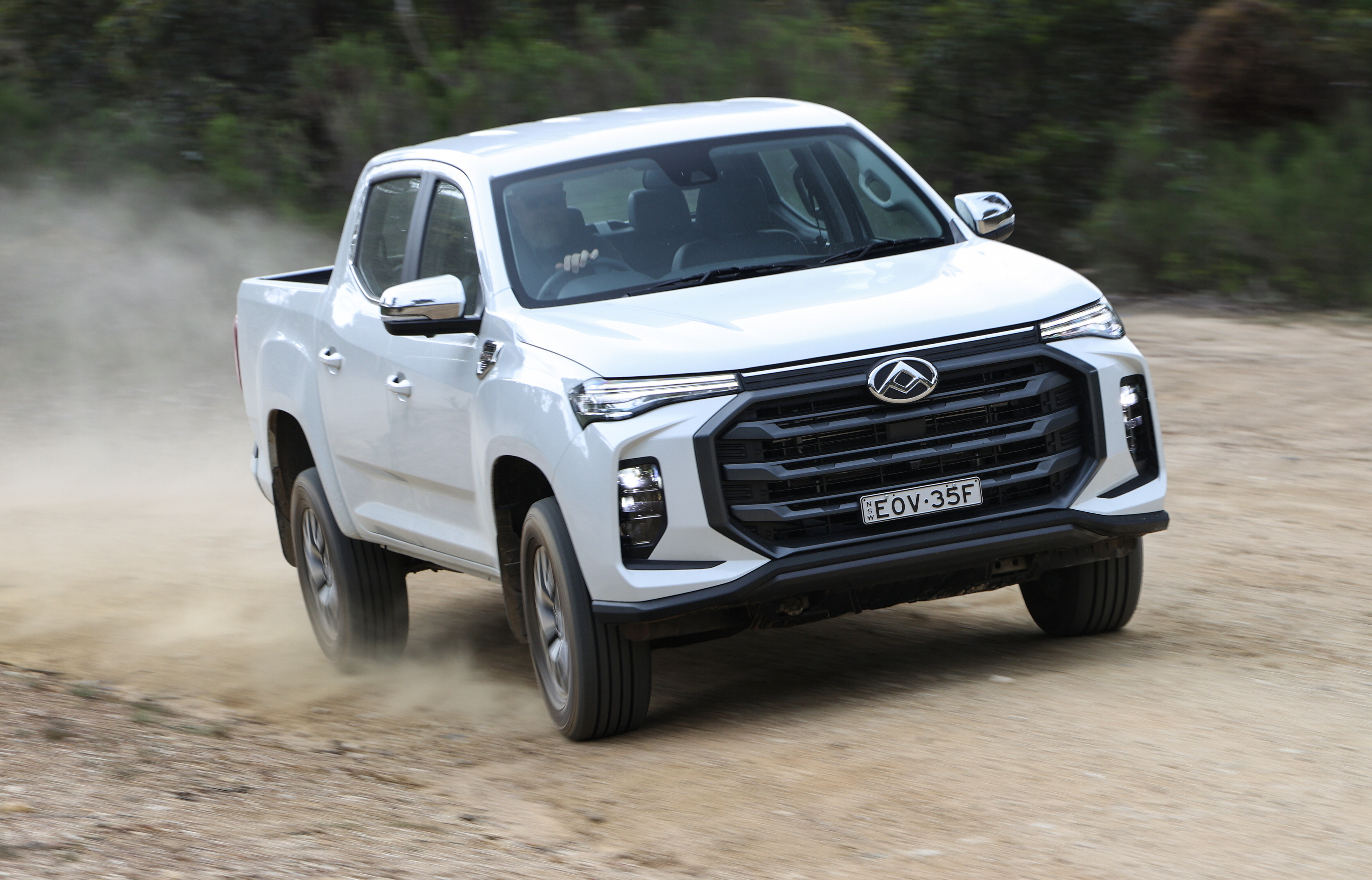IT MIGHT seem like a long bow to draw, but the two 4x4s on these pages actually have quite a lot in common.
However, there’s a huge difference in price – more than $40,000, in fact. The Mahindra you see here has a drive-away price of just $32,990 and comes with a three-year, 100,000km warranty. The best dealer-sourced pricing for this LC79 LandCruiser, however, is a whopping $74,290.
Neither truck is perfect, but the Toyota has the runs on the board in terms of reputation, and durability. We’re not suggesting the Mahindra Pik-up is any better than the Cruiser, but is it $40K better?
SHORT ON GEARS THE move to the 4.5-litre 1VD-FTV bent eight has given the Cruiser a bucket-load of torque – 430Nm from 1200-3200rpm – and more potential power at 151kW. But this is hamstrung by a very low-geared five-speed manual, which sees the Cruiser screaming its head off at highway speeds. That said the Euro 5 update of Toyota’s workhorse, due about now, will see a taller fifth gear, plus more airbags and electronic stability control and traction control. But those changes will also see even more added to the already high sticker price.
The wider front axle to accommodate the big diesel also left an unchanged rear axle track that doesn’t do much for the Cruiser’s handling when lugging a load. Perhaps the biggest boon for the Cruiser is its effortless 3500kg towing capability. It remains the best original-equipment vehicle on the Aus market for towing a big weight a big distance.
The Mahindra sports a modest AVL 2.2-litre four-pot common-rail turbo-diesel that provides 88kW/280Nm, as opposed to the Toyota’s 151kW/430Nm, but it will tow up to 2.5 tonnes and can haul a one-tonne payload on its back. Just don’t try to do both at the same time.
The Pik-Up’s body, like the LandCruiser’s, sits on a ladder-chassis frame and, in single cab form, handles the same size tray as the Toyota. The frames are near identical. However, where the LC79 uses a coil-sprung live-axle front end, the Pik-up opts for torsion bars.
FIRST TEST BOTH use a five-speed manual gearbox and a two-speed transfer case; in the case of the Mahindra it’s a BorgWarner electric shift. The Toyota still uses an extra stick and free-wheeling hubs.
Mahindra is keen to point out that while the 4WD selector is a dial, it’s not shift-on-the-fly; try it and you’ll eventually break stuff. As our test LC79 was a top-of-the-range GXL, it arrived with diff-locks front and rear. The Mahindra features an Eaton auto locker on the rear diff as standard kit. The Pik-Up also gets cruise control, the Cruiser doesn’t.
The Pik-Up is squarely aimed at the agricultural market as a cheap farm ute. However, my experience with the subcontinent’s fourby has shown it to be quite a surprising and honest little package. The term “as honest as yoga pants” springs to mind. Just to inject a little real-world relevance to this comparison we also added a 400kg payload to each vehicle to make them work a little harder.
First stop was some bog holes in the Beerburrum State Forest to test the traction and fording capabilities of both trucks. The result was a one-all tie, with both trucks getting stuck. Ground clearance, or rather a lack of it, is the Mahindra’s biggest issue; the torsion bar front end is protected by bash plates but it still runs aground quite easily.
I got the Cruiser stuck after losing momentum and having to resort to using the diff-locks, by then it was all over traction-wise. The only issue with the diff-locks in the Toyota is that you have to be in low-range to select them, and they only engage when the wheels spin.
This may not be a big deal if you are crawling slowly through terrain that you know, but if you’re rumbling along in 4H and hit a soft patch, as I did, you’ll lose all momentum before you can grab the lockers. That is, of course, always bearing in mind that you shouldn’t try and engage any diff lock while the wheels are spinning. The auto locker in the Pik-Up works in all ranges, including 2H, and will help you keep moving before things get dire.
On the open road to Maleny in the Sunshine Coast hinterland, the Cruiser made good use of its prodigious torque on the hills, but that didn’t stop my mate Allan dropping a couple of cogs in the Mahindra and overtaking me on the drag up the hill from Landsborough.
The stiffly sprung Cruiser handled the load quite well, with not too much body roll. But the Pik-Up understandably rocked and rolled quite a bit more. Dampening is an issue for the Indian-built ute – some aftermarket shocks would take some bounce out of the Mahindra over the rough stuff.
PADDOCK PLAY WE hit the farm to give these two trucks some bush playtime. It’s easy to see why the Cruiser is so popular in the paddocks – it just feels planted when off the track. Feedback through the steering wheel is excellent, and it doesn’t keel over much with a load on undulating terrain, though it would be better with a wider rear track.
The notchy truck-like gearshift of the Toyota is easy to live with in this environment, and the big bent eight is happy to lug along quietly at any speed.
The Pik-Up had more of a tendency to keel over on its suspension, but nothing startling. The gear-shift in the Mahindra is pretty vague and has a huge throw, but the key to getting the little red beast over rough country is to keep the revs up; make sure you’re in the right gear and stay in it. The Toyota is understandably more forgiving in this department.
Ground clearance also played to the Toyota’s advantage among the rocks and tussocks. The Cruiser would still cock a leg when clambering over embankments, but the Mahindra was more prone to showing daylight under its nether regions.
SAND ’N’ SURF A ROMP on the beach at Bribie Island played to the Mahindra’s strengths – this thing just loves a squirt on the sand. With tyre pressures down and a bootful of revs, the Pik-Up happily clambered along the tracks and trundled comfortably along the beach. In this environment the Cruiser feels a lot less nimble. It roars through the soft stuff where the Pik-Up seems a more relaxed drive.
Sure, the Toyota remains the pick of the two, but at a huge premium. That premium does
give you a massive dealer and parts network. Plus there’s the resale factor based largely on a formidable reputation earned over more than five decades in this country. Call it the Toyota Tax, if you will.
RESALE EQUATION SHOW me a used LC79 anywhere near the price of a new Mahindra and I’ll show you a truck that has spent its working life in muck up to the door handles on a mine site somewhere. The Mahindra’s resale, however, disappears into the basement as soon as you drive out of the dealership.
The Pik-Up is a tough little customer and I suspect time will prove it to be quite a durable jigger. It’s a basic, simple design that holds little in the way of surprises. A set of aftermarket shocks, an air-bagged rear end and some torsion bar adjustment would easily crank up the ground clearance of the Pik-Up while also addressing the bounce. There’s even a power chip available for it. Let’s face it, how many people leave their 4x4s completely stock anyway? That still leaves a lot of change from Toyota-type money.
It mightn’t be cool, and it may even strike some as odd, but the Pik-Up provides some bang for your buck.
MAHINDRA PIK-UP 4X4 Engine 2.2-litre mHawk 4-cylinder common-rail turbo-diesel Power 88kW @ 4000rpm Torque 280Nm @ 1800rpm Payload 1000kg Towing 2500kg (braked) Warranty 3-years/100,000km Price As Tested (drive-away) $32,990
TOYOTA LANDCRUISER LC79 GXL Engine 4.5-litre 1VD-FTV 8-cylinder turbo-diesel Power 151kW @ 3400rpm Torque 430Nm @ 1200-3200rpm Payload 1000kg Towing 3500kg (braked) Warranty 3-years/100,000km Price As Tested (dealer sourced drive-away) $74,290
To see how these 4x4s performed watch the Mahindra Pik-up vs Toyota LC79 video review.

